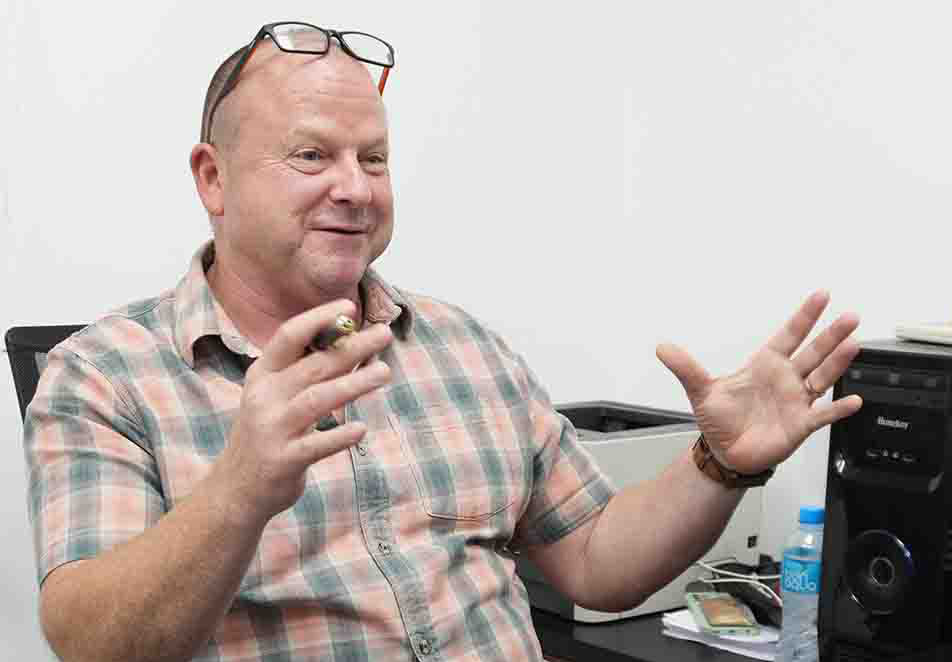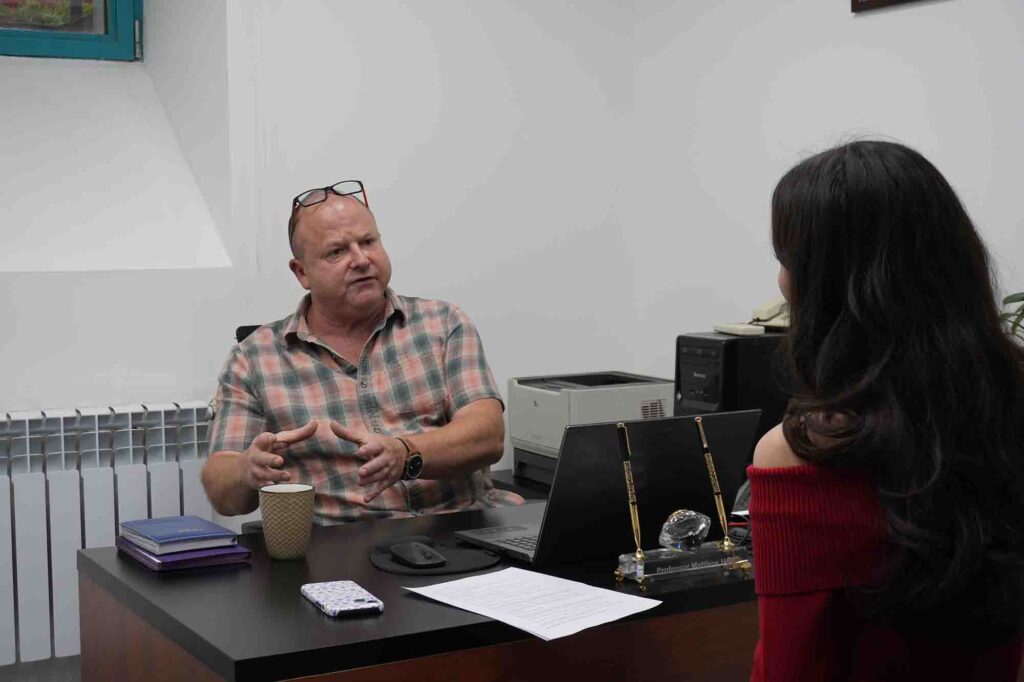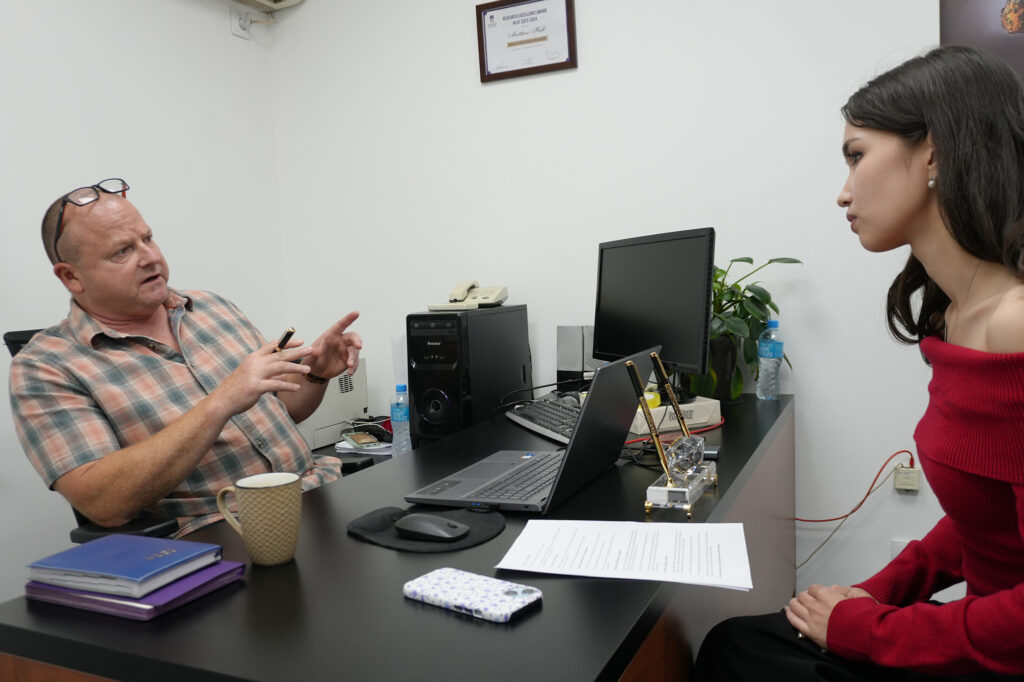Psychology Deptartment head introduces master’s degree to KIMEP, open to all majors.

Tomiris Mukhamediyar)
Dr. Matthew Hall, the Chair of
KIMEP University’s Psychology
Department, discusses his vision
for the department and addresses
the importance of mental health
education in Kazakhstan. Hall said he wants to build a department by introducing advanced re-
search tools and hiring new faculty members. He shares how he thinks KIMEP’s psychology pro-
gram distinguishes itself within the region.

Q: Why did you come to KIMEP University?
A: I was finishing a contract at the
University of Egypt. Kazakhstan is a region I wasn’t familiar with, and I wanted to look into the development opportunities. KIMEP’s medium of education is English, and it has both an international and regional reputation. After doing background research, I felt I could contribute positively, especially in terms of mental health and psychology. I saw a need to increase mental health provision and to help train future generations of psychologists.
Q: All of us are the cumulation of our experience, what experiences before Kazakhstan will help you build KIMEP’s psychology department?
A: Working at seven different in stitutions, particularly in psychology departments or schools, I’ve seen how they operate. They all aim for international standards of excellence in teaching, research, and management. In places like North America and Europe, accreditation by psychological associations re-
quires a holistic approach. It’s not just about teaching; research, resources, campus facilities,
and workloads for students and management are all considered. For example, we’ve equipped a teaching laboratory with tools like SPSS (Statistical Package for Social Sciences) for data analysis and NVivo for qualitative analysis. We are waiting for equipment to measure things like eye-tracking, so you can see where people particularly look. We also have got virtual headsets, you’ll be able to see the challenge that somebody who has dementia might face. An EEG, where you’re picking up brain patterns. You can see the impact on the brain on certain different things in certain contexts. By offering students hands-on research opportunities, I believe, in the region, it will be the only place that has this kind of equipment. It will take two to three years to be carefully established.
“In Kazakhstan, public conversations about mental health are not frequent. There is a lack of public awareness and education, which makes stigma more serious.” — Dr. Matthew Hall
Q: KIMEP now offers a Masters program in psychology. What distinguishes this program from others in Kazakhstan?
A: This is a conversion-type master’s, meaning students from any undergraduate discipline can enroll. Other programs in the region might require an undergraduate degree in psychology, but this one does not. It offers both breadth and depth, allowing students to start from scratch and reach an advanced level by the end of the program. The goal is to eventually offer a doctoral program as well.
Q: How does this program prepare students to become licensed psychologists?
A: Kazakhstan legislation on psychologists and social work currently only applies to those working in state-funded or state-type agencies like state schools and state medical institutions. At present, students or anyone else can practice psychology privately without a license. The program will prepare students to meet the standards required to work in state agencies, which expands their options for employability. Students will have the skills necessary to work in state institutes or to go into private practice. It is very much a practical program, involving therapy, client observations, and mentorship so
that students gain hands-on experience. By the time they graduate, students will know what to do in practice. Without advanced training, private practice can be risky, as undergraduate degrees don’t always include the practical implications and interactions involved in real life. For instance, in working with potentially dangerous clients, you need the right training to ensure safety and proper risk assessment.
Q: KIMEP has brought in two new professors in psychology department this year. What do each of them bring for students?
A: Professor Krishna Mohan Kotra’s work is focused on clinical and cognitive-based professional practice. Professor Kyle Msall’s research centers on extremism, and he has worked with survivors of ISIL, so he brings in a psychosexual dimension. Professor Herman Grobler has expertise in therapeutic and child development practices. Together, they bring a comprehensive skill set to both undergraduate and postgraduate education.
Q: How serious is the stigma around mental health in Kazakhstan?
A: In North America and Europe, conditions like ADHD and anxiety are less stigmatized, because of
public conversations and celebrity openness. In Kazakhstan, public conversations about
mental health are not frequent. There is a lack of public awareness and education, which makes
stigma more serious. If you look back into the history, HIV/AIDS was stigmatized in the early days because people didn’t know how it was transmitted and reacted in fear. Public conversations and education campaigns are needed to reduce stigma.
Q: How can KIMEP’s psychology department help to break down the stigma?
A: We aim to train our students to become advocates for positive mental health, educating the public and raising awareness. This will be done through publications, outreach in schools, social media campaigns, and events like World Mental Health Day. Engaging with parents and young people will also help to spread awareness. We are developing links with schools for special needs, such as autism, to understand how Kazakhstan provides for these cases. There’s a bit of a taboo in terms of talking about sexual relations and romantic relations. One of the projects we want to do, which, come up in a couple of years, is to provide an app that could be used in Kazakhstan, in Central Asia. There’ll be an English-Russian and Kazakh that gives health related information in digestible formats, not just into sort of relationship of mental health, body hygiene, this whole range of different things that could be covered in that app. So it’d be free to use.
Q: Many KIMEP students mention feeling stressed (especially during exams). What advices would you give for students?
A: Let me start by saying, stress tends to have a negative connotation. Stress isn’t necessarily bad.
We all feel stressed, and we’re all pressured when we have faced deadlines. Where it becomes
problematic is when people become overly stressed and anxious. I would say one of the things for students is time management and planning. Everybody has limits on the resources they
have, whether that’s money, time, or particular resources. If you know that you have done your very best that you can do with the resources you’ve got, then it doesn’t matter whether you get a “C”, a “B”,
or an “A”. You know that that’s the best you could have done then. If you didn’t get what you want,
you’d know that you did the best that actually next time you’ll change a few things and you all will
eventually get it. That leads to a sense of self satisfaction.
Q: Are there any new initiatives in the works to help students cope with stress, whether through courses, counseling services, or extracurricular activities?
A: We’re having World Mental Health Day on the 17th of October. Then there’s World Psychology Day in April next year. While we cannot offer counseling services due to conflict of interest, we provide formative feedback and scaffolding to support students. For example, psychology students can submit drafts of assessments for feedback before deadlines, helping them improve and reduce stress. It is surprising how some students do not use that opportunity.
Q: What are the long-term goals for the psychology department?
A: Our main goal is expansion. Now we have around 60 students. In the UK, there is one psycholo-
gist per 1,250 people, while in Kazakhstan, it’s one for every 10,000. By training more students,
we can help address the mental health needs in Kazakhstan. Growing the department and improving the
quality of education will make KIMEP a top choice for psychology students, allowing grad-
uates to work across broader scopes, including English, Russian, and Kazakh-speaking populations. The long-term goal is to become a large center of excellence. In the longer term, for the development we want to establish a therapeutic center off-campus for local residents, who do have mental health issues. Psychology is not just about if you got a problem, it is about how to keep good mental health. However, it is going to take some time.

